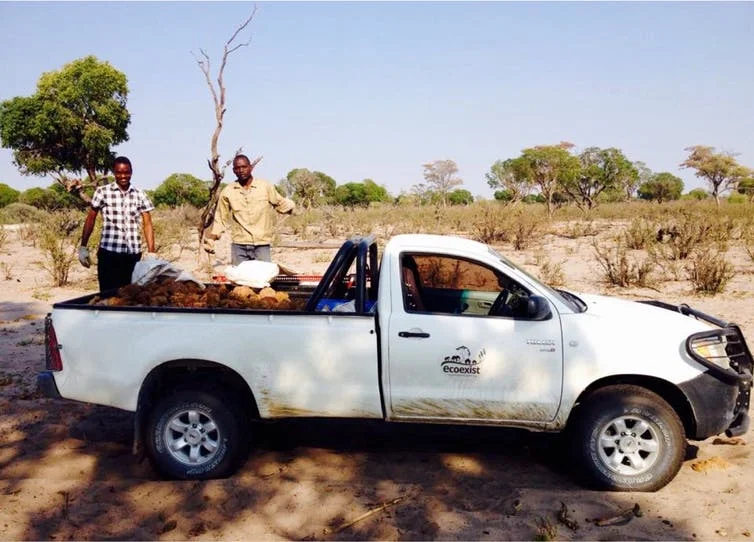Burning Chillies and Dung Could Help Stop Elephants Damaging Farmers’ Crops, While We Search For Big Solutions That Work
/Chillies Photo by Heijo Reinl on Unsplash
By Rocio Pozo, Postdoctoral Research Associate in Environmental Sciences, University of Stirling. First published on The Conversation.
Note from Anne: AOC has shared extensive research about human’s conflict with elephants in Africa. In my experience most Westerners have almost no patience, understanding or empathy around the lives of African farmers living with the elephants. Please watch the embedded video ‘Pathways to Coexistence’ documentary (2015), a SUPERBLY well-done, balanced examination of a conflict between elephants and people, conflict that will only intensify in Africa with population growth and economic expansion.
Humans — specifically African farmers — are not the bag guys in this wrenching drama around saving our precious elephants. A change in the overly-simplistic, American and European Twitter-universe, off-with-their heads attitudes towards trophy hunters (we agree) and farmers (we don’t agree) is long overdue on this complex topic.
We are all looking for quick fixes on this super challenging problem, and as Rocio writes and the second video demonstrates, the briquettes did not solve the problem but diminished the number of hours in the night crops were at risk Imagine 15,000 elephants and 15,000 farmers on the same land! But by involving the farmers — who for the mostpart do respect the elephants and the reality that their farms often traverse historic elephant migration paths — projects like this one seek to decrease negative perceptions of elephants among farmers in the Eastern Okavango Delta Panhandle of Northern Botswana . Since Rocio wrote her article 15 months ago, the future of these elephants is very much on the front burner, with discussions of reintroducing tropy hunting. Rocio Pozo’s article creates empathy and understanding, as we are all desparate to solve this problem.
The elephant is fighting for its survival. Many of these animals are now contained in national parks and other protected areas across Africa and Asia, but these are simply not big enough to support isolated populations of elephants. So they are often forced to go out to look for food and water ever closer to human settlements. And this is when the interaction between people and elephants can develop into conflict.
One of the most widespread and costly sources of this conflict is the foraging or damage of crops by elephants. Crop-using elephants can destroy a farmer’s property and a year’s worth of food in just one night. Unsurprisingly, this makes it very challenging to get local communities behind elephant conservation efforts. But my colleagues and I have found a cheap and easy solution that could help keep elephants away without harming them: burning blocks of dung and chilli.
In the Eastern Okavango Delta Panhandle of Northern Botswana, conflicts between elephant conservation and local communities are common. On average, farmers report around 180 cases of elephants using and destroying their crops every year. Botswana has more elephants than any other country in the world, and the north of the country holds the largest populations.
I flew to Botswana for the first time in 2014 to start collecting data for my PhD, in a collaboration between the University of Oxford and the Ecoexist Project. The main objective of my project was to approach the conflict between elephant conservation and peoples’ livelihoods by considering both as important parts of the issue. And so I gathered data on the conflict, how it had developed over previous decades and what we could do to mitigate it in the future.
In the Eastern Panhandle, most people work simply to grow enough food to survive. Local communities are poor and, during the harvesting season, farmers have to work very hard not only to grow their crops but also to keep elephants away. This meant it was a real challenge for us to think of methods that could be implemented and maintained by local farmers over time.
Chilli methods
Since the 1990s, academic conservationists have reported that chillies are efficient at repelling elephants. Elephants, with their long noses – their trunks – have one of the most acute sense of smell in the animal kingdom. Chilli smoke stimulates their olfactory receptors and their respiratory tract is extremely sensitive to the unpleasant smell. We believe this causes irritation that they can remember well enough to put them off coming back to the area for at least a few days afterwards.
Dung delivery. Rocio Pozo, Author provided
A wide variety of ways of using chilli to repel elephants from crops have been trialled in different parts of Africa and Asia, with varying results. These include creating fences from ropes and pieces of cloth greased with chillies, spraying solutions of chilli and resin, and burning briquettes made from elephant dung, water and dry chillies.
In the area we studied, local farmers cannot afford materials to build fences, and other methods such as using beehives as fences have not been successful in the past. So we decided to test chilli briquettes because they are cheap and easy to use. Although the smoke from chilli briquettes can be unpleasant, it has no negative effects for people or for the environment.
(Note from Anne: Dr. Lucy King’s Elephants & Bees Project is active in Botswana, and I’m trying to understand why it’s successful in other countries but alleged by Rocio Pozo to be ineffective in Botswana.)
I love the smell of chilli in the morning. Rocio Pozo, Author provided
This led us to follow some previous recipes and start what we called the “chilli briquette factory” at the Ecoexist Project Camp in the Eastern Panhandle. Making chilli briquettes was a lot of fun, but also really hard work. In total, we collected and crushed more than 1 tonne of elephant dung and used around 250kg of really spicy chillies to make around 600 briquettes. We then trialled them in a selection of test sites (rather than working farmers’ fields) so we could control what attracted the elephants. Placing a small ember in the middle of each briquette kept it smouldering for six to seven hours.
After four months of driving more than 150km every day to monitor experiment sites and leaving briquettes to smoulder overnight, we found that the chilli briquettes were efficient at deterring elephants.. Most importantly, thanks to our surveillance cameras, we discovered that to avoid the chilli-briquette smoke, the elephants went from being nocturnal to being active in the day (diurnal), when –in general– the presence of farmers was enough to keep them away.
This shows that chilli-briquettes are an excellent non-lethal and low-cost opportunity for local farmers to keep elephants away from their crops or properties in the short term. But we hope it will also provide a long-term benefit by helping to decrease negative perceptions of elephants in the region. This could lead to more support for conservation efforts and eventually have an impact on elephant numbers.

































